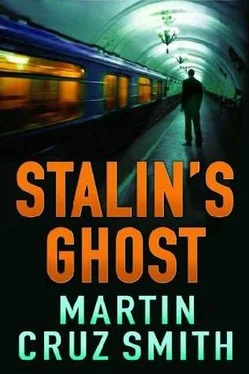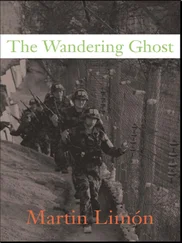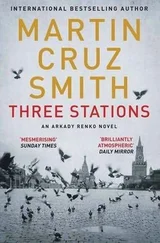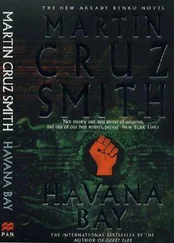Martin Smith - Stalin’s Ghost
Здесь есть возможность читать онлайн «Martin Smith - Stalin’s Ghost» весь текст электронной книги совершенно бесплатно (целиком полную версию без сокращений). В некоторых случаях можно слушать аудио, скачать через торрент в формате fb2 и присутствует краткое содержание. Жанр: Триллер, на английском языке. Описание произведения, (предисловие) а так же отзывы посетителей доступны на портале библиотеки ЛибКат.
- Название:Stalin’s Ghost
- Автор:
- Жанр:
- Год:неизвестен
- ISBN:нет данных
- Рейтинг книги:4 / 5. Голосов: 1
-
Избранное:Добавить в избранное
- Отзывы:
-
Ваша оценка:
- 80
- 1
- 2
- 3
- 4
- 5
Stalin’s Ghost: краткое содержание, описание и аннотация
Предлагаем к чтению аннотацию, описание, краткое содержание или предисловие (зависит от того, что написал сам автор книги «Stalin’s Ghost»). Если вы не нашли необходимую информацию о книге — напишите в комментариях, мы постараемся отыскать её.
Stalin’s Ghost — читать онлайн бесплатно полную книгу (весь текст) целиком
Ниже представлен текст книги, разбитый по страницам. Система сохранения места последней прочитанной страницы, позволяет с удобством читать онлайн бесплатно книгу «Stalin’s Ghost», без необходимости каждый раз заново искать на чём Вы остановились. Поставьте закладку, и сможете в любой момент перейти на страницу, на которой закончили чтение.
Интервал:
Закладка:
In Moscow she had found a position at a medical clinic. Eva was good with the younger patients, especially those who couldn’t sleep. She recorded them and sent the tapes to their families. Her portrait, Arkady often thought, could be painted in just black and white, although lately more and more in black alone and with sharper angles.
The further apart they grew, the more the bed was their mutual safe haven. Words were their enemy, the expression of failed hopes. Sex was performed in silence and it was difficult to say how much of their lovemaking was passion and how much the desperate scraping of a dead match.
The phone rang. Neither Arkady nor Eva wanted to connect with reality, so the caller talked to the answering machine.
“Where are you, Renko? We have a situation that has to be dealt with. If just anyone dead popped up on a Metro platform, it could be a hoax. Stalin is different. To use a likeness of Stalin is a clear provocation. Somebody is behind it. Why did you turn off your cell phone? Where the devil are you? Call in!”
“That was Prosecutor Zurin. What was he going on about?” Eva asked.
“Stalin has been seen a couple of times late at night at a Metro station.”
“Stalin in the Metro? Really? Just what does this Metro Stalin do?”
“Not much. He stands on the platform and gives passengers a wave.”
“Doesn’t execute anyone?”
“No, not a single one.”
“What will Zurin do?” Zurin generally bored Eva, but now she hiked herself up on her elbows.
Arkady was encouraged. This was more conversation than they’d had in a week.
“Well, as the prosecutor says, Stalin is different. Stalin is a minefield and there are no good moves. Call anything about Stalin a hoax and Zurin will have superpatriots to deal with. Do nothing and let rumors spread and he’ll have a shrine on his hands. When the tsar’s bones were found, pilgrims showed up the following day. The Metro will be a mob scene and Zurin will go down as the man who brought the Moscow subway system to a stop. Or-Zurin’s third choice-embrace the situation, announce that the sightings are genuine visions and be left high and dry as a raving lunatic if no more sightings occur.”
“And Zurin called you. So he wants to send you into the minefield first.”
“Something like that.”
“But you’re staying here? I didn’t know you were going to be here all day.”
“I am. Did you have other plans?”
“Except you’re always thinking about work, so you’re not really here when you are here.”
“Not all the time.”
“Yes, all the time. Which is good, I suppose, in an investigator. I know when a ghost joins us. I feel the company.” This was a loaded statement, because there were ghosts and there were ghosts. “I suppose you can’t help becoming involved.”
“Actually, it’s better not to get involved.”
“You can do that?”
“I have to. I can’t spend my life brooding on the dead.”
He closed his eyes and saw the man with the cleaver in his neck. The odds were astronomical against a drunken woman’s dispatching her husband with a single, perfect swing of a cleaver between the vertebrae and through the spinal cord, as Isakov and Urman maintained. A woman so drunk she most likely wouldn’t remember anything she said, let alone a confession. However, the blood spatter pattern on the kitchen walls did seem to match the stains on her housedress. The cleaver handle pointed to the victim’s left shoulder, indicating a right-handed attack; she was right-handed. The fact that no neighbors called the militia about the noise of the fight suggested that the husband and wife had gone toe to toe before. Had they argued over who had the dragon? Enough snow, enough vodka, a ready blade? With that combination you didn’t need professional killers.
Either way, Arkady was annoyed at himself for drawing the attention of Isakov and Urman. Asking questions was the last thing he should have done, although it was instructive watching the captain and his eager lieutenant.
“You’re doing it now,” she said.
“Sorry.”
“I know your secret,” she said.
“What’s my secret?”
“In spite of everything, at heart you’re an optimist.” She amended that. “In spite of me , you’re an optimist.”
“We have our moments.”
“I have proof. It’s all on tape.” When Eva and Arkady were first together she would take a pocket-size tape recorder and cassettes to record what they were doing, whether it was a day of skiing or a simple walk, to play back later and laugh at. When was the last time he heard her laugh?
He held her heartbeat in her breast. With her he was always half aroused. If that wasn’t cause for optimism, what was?
Outside the day faded, the sun a bonfire in the snow.
Down on the street, a road crew was attempting the repair of a pothole. Four sturdy women dug while a man supervised and occasionally held a lamp. Each day for a week they had poured steaming asphalt that settled into a widening hole, a daily demonstration of futility.
The phone rang. A sugary Zurin talked to the answering machine this time, apologizing for disturbing Arkady on his day off and hoping that Arkady wasn’t using his machine to avoid calls. “You wouldn’t be as low as that.”
No problem, thought Arkady. He pulled the phone line from the jack, then remembered Zhenya and reconnected.
Eva watched. “You still expect Zhenya to call?”
“He might.”
“He will be fine. He’s a fish in water.”
“It’s cold out.”
“Then he’ll find someplace warm. Are you sure you saw him?”
“No, but I’m sure he was there. Did he say anything to you?”
“Two words: He’s here . Then he raced out the door.”
Nobody knew how many homeless kids there were in Moscow. Estimates ranged from ten to fifty thousand, in age from four to sixteen. Few were orphans; most were running from alcoholic, abusive families. The kids ate and wore what they could steal or beg. They slept on heating pipes or in unwatched trains. They sniffed glue, bummed cigarettes, sold themselves for sex outside the Bolshoi, and the closest thing to a steady roost was Three Stations. The week before, the militia had collared Zhenya, along with his friends Georgy and Fedya. Zhenya was released to Arkady, but Georgy and Fedya had simply been released for lack of shelter space. The president himself called homeless kids a threat to national security. Now that Georgy had a gun, maybe the president was right.
“Arkasha, open your eyes. Your little Zhenya wins more money playing chess than you earn risking your life. You think he’s like you, a sweet, agreeable soul. He’s not.”
“He’s twelve years old.”
“He’s somewhere between twelve and a hundred years old. Have you seen him play chess?”
“Hundreds of times.”
“He squeezes his opponent like a python, eats him and digests him alive.”
“He’s good.”
“And you are not responsible for him.”
Arkady had looked into adopting Zhenya. However, with no information about his parents, even whether they were dead or alive, legal adoption was out of the question and an arrangement had evolved. Officially, Zhenya was on the rolls of the shelter where Arkady had first met him. In fact, Zhenya slept on the apartment sofa, as if he had happened by and nodded off. Zhenya was Pluto, a dark object detectable more by its effect on the planets than by direct observation.
“Consider me a python.” Arkady slipped into bed.
They ate in bed. Brown bread, mushrooms, pickles, sausage and vodka.
Eva filled his glass. “Last night at the clinic, one of the other doctors, a woman, asked me, ‘Do you know the curse of Russian men? Vodka! Do you know the curse of Russian women? Russian men!’”
Читать дальшеИнтервал:
Закладка:
Похожие книги на «Stalin’s Ghost»
Представляем Вашему вниманию похожие книги на «Stalin’s Ghost» списком для выбора. Мы отобрали схожую по названию и смыслу литературу в надежде предоставить читателям больше вариантов отыскать новые, интересные, ещё непрочитанные произведения.
Обсуждение, отзывы о книге «Stalin’s Ghost» и просто собственные мнения читателей. Оставьте ваши комментарии, напишите, что Вы думаете о произведении, его смысле или главных героях. Укажите что конкретно понравилось, а что нет, и почему Вы так считаете.











